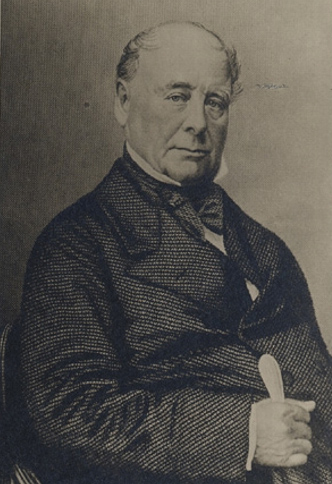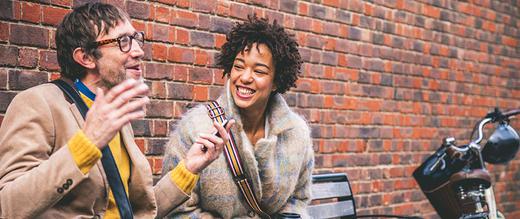The views expressed in our content reflect individual perspectives and do not represent the authoritative views of the Baha'i Faith.
In the 1840’s, a Canadian author named Thomas Chandler Haliburton wrote a book with the strange title of Letter-Bag of the Great Western: or, Life in a Steamer. Few remember the book today, but almost everyone knows the famous piece of advice Haliburton included in it:
Never discuss religion or politics with those who hold opinions opposite to yours; they are subjects that heat in handling, until they burn your fingers… p. 115.
If you grew up like I did, you probably heard that expression once or twice. My mother, who had a very genteel Southern upbringing, sure drummed it into me. Her version went like this: “Never discuss religion or politics in polite company.”
For some reason it didn’t work on me.
I always wanted to talk about those two forbidden topics. I thought “why should we exclude the most interesting stuff from our conversations?” After all, they’re two of the most important and influential parts of human life. But just as my mother warned me, I did get myself into trouble a few times when I talked about those subjects with people whose views I didn’t already know. Oops—sorry, boss.
We’ve reached an interesting time and place in our culture, when the social pressure to have the “correct” beliefs has intensified. Whether you call this political correctness or institutionalized politeness or the fear of offending, we’ve become much less tolerant and accepting of speech that potentially harms others. In many ways that’s a good thing—it means fewer offended people—but in some other ways it has stultified and limited our discussions and our honest interaction, especially when we guardedly stop expressing our true opinions by worrying whether they might bother or even mildly upset someone else.

Thomas Chandler Haliburton
So I want to suggest something radical—let’s throw out Mr. Haliburton’s advice, at least where it concerns religion, and start talking about our beliefs openly and honestly.
Don’t get me wrong—I’m not advocating that we all engage in heated political debate at every business meeting, dinner party and family gathering. That wouldn’t work. We live in a world of increasingly varying ethnicities, belief systems and viewpoints, and if we all expressed our thoughts at once, without tact and moderation, we’d all be in trouble. So let’s leave out the polarizing political arguments, and instead focus on the truly important world of our innermost spiritual beliefs.
I have a good friend named Larry who I think has mastered the gentle art of this kind of talk about deeply-held beliefs, and I’ve studied his non-threatening and very effective approach for a long time. He has successful, enlightening conversations about important issues constantly—in fact, he’s become known for it among his many friends. Here’s how he does it: he only asks questions. Like this: “How do you feel about the Pope’s latest message on climate change?” or “What do you think about this issue of the Confederate flag?” Last time we talked, he asked me “How do the Baha’is deal with the question of women in the military?” He doesn’t do it to just get conversations going, either—he sincerely wants to know how people feel about the questions he asks. And guess what? They truly prompt fascinating and revealing discussions among people.
Baha’is love and welcome questions. In the Baha’i calendar, we even have a month named Questions. In a religion where the independent investigation of truth is a primary principle, questions are encouraged and welcomed, and logical, reasonable explanations take the place of superstition, blind faith and dogma:
…make use of intelligence and reason so that you may dispel these dense clouds from the horizon of human hearts and all hold to the one reality of all the Prophets. It is most certain that if human souls exercise their respective reason and intelligence upon the divine questions, the power of God will dispel every difficulty, and the eternal realities will appear as one light, one truth, one love, one God and a peace that is universal. – Abdu’l-Baha, The Promulgation of Universal Peace, p. 79.
Until now it has been said that all religions were composed of tenets that had to be accepted, even if they seem contrary to science. Thanks be to God, that in this new cycle the admonition of Baha’u’llah is that in the search for truth man must weigh religious questions in the balance of science and reason. God has given us rational minds for this purpose, to penetrate all things, to find truth. – Abdu’l-Baha, Divine Philosophy, p. 102.
If we can master the art of asking questions, we can learn to listen to each other’s thoughts with an open mind, and then express our opinions in a civil way. We can learn to remove any acrimony from our ideas, and simply resolve to listen carefully, without taking offense.
When we learn those skills and apply them, we’re suddenly set free from shallow small talk. We’re no longer limited to talking about the weather—we can discuss deep, meaningful, fruitful topics. Also, we don’t have to limit that kind of talk to people we already know and understand. Instead, we should actually endeavor to discuss those more profound topics in mixed company. We can truly learn from each other that way, and have some understanding of the other person’s point of view. We can reason through our opinions and work toward agreeing on objective truth, rather than retreating to our respective corners and defending our personal beliefs. We can build unity.
In the Baha’i Faith, this subtle art is known as consultation:
In this Cause consultation is of vital importance, but spiritual conference and not the mere voicing of personal views is intended. In France I was present at a session of the senate, but the experience was not impressive. Parliamentary procedure should have for its object the attainment of the light of truth upon questions presented and not furnish a battleground for opposition and self-opinion. Antagonism and contradiction are unfortunate and always destructive to truth. In the parliamentary meeting mentioned, altercation and useless quibbling were frequent; the result, mostly confusion and turmoil; even in one instance a physical encounter took place between two members. It was not consultation but comedy.
The purpose is to emphasize the statement that consultation must have for its object the investigation of truth. He who expresses an opinion should not voice it as correct and right but set it forth as a contribution to the consensus of opinion, for the light of reality becomes apparent when two opinions coincide. A spark is produced when flint and steel come together. Man should weigh his opinions with the utmost serenity, calmness and composure. Before expressing his own views he should carefully consider the views already advanced by others. If he finds that a previously expressed opinion is more true and worthy, he should accept it immediately and not willfully hold to an opinion of his own. By this excellent method he endeavors to arrive at unity and truth. – Abdu’l-Baha, The Promulgation of Universal Peace, p. 72.

















Comments
Sign in or create an account
Continue with Facebookor